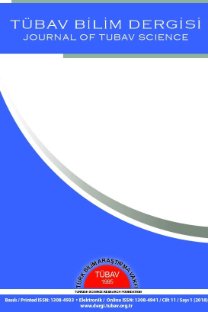OKUL ÖNCESİ EĞİTİM KURUMLARINA DEVAM ETMEKTE OLAN 60-72 AYLIK ÇOCUKLARIN BESLENME ALIŞKANLIKLARI: ÖĞRETMEN GÖRÜŞLERİNİN DEĞERLENDİRİLMESİ
Anahtar Kelimeler:
Okul Öncesi, Beslenme Alışkanlıkları, 60-72 Aylık Çocuklar, Öğretmen.
This research has been carried out to evaluate the teachers’ opinions about behaviors of nutrition habits of children going to pre-school education institutes. This research includes 415 children going to pre-school education institutes within the center and towns of Konya. In this study ‘simple random sampling’ and ‘graded sampling’ techniques have been applied. The data of this study has been gathered through a survey form developed by researchers during AprilMay 2010. SPSS 15.0 packet program has been used to evaluate the data. For each question, tables showing numeric and percentage values have been prepared and comparison has been carried out according to the gender with the technique of ki-kare. Children in this study are between 60-72 months old. If we take the answers given by the teachers about their students as a base of our study, around half (49.4%) of children never pick out between food. This study has also shown that majority of the boys and the girls (respectively 64.2%, 60.3%) start and finish eating together. The relationship between children’s gender and their starting, finishing time has been found out statistically Bu makale, Yrd.Doç.Dr. Didem ÖNAY DERİN’in danışmanlığında yürütülen Yüksek Lisans tez çalışmasından hazırlanmıştır. meaningful (p= 0.013). As a matter of fact, boys (14.9%) in comparison with girls (8.4%) start and finish eating before everybody. It has been observed that 41.2% of the children eat with great appetite and eat up what they have on their plate. During this study it has also been observed that of the children having their meals in the classroom, 71.3% always use spoons, 74.0% always use forks and 57.1% never use knives while eating. When asked to the teachers whether their children have the habit of washing hands and mouths before and after meals, most of the teachers (respectively 85.5%, 74.0%) say that the students wash their hands and mouths both before and after the meals. Pre-schooling period is a time when a lot of habits which form the basis of adulthood are developed. In this period it is very important to have the habit of better way of eating habits as well as adequate and balanced diets.
Keywords:
Pre-School, Nutrition Habits, 60-72 Month Old Children, Teacher,
___
- R. Kutlu, S. Çivi, “Özel bir ilköğretim okulu öğrencilerinde beslenme alışkanlıklarının ve Beden Kitle İndekslerinin değerlendirilmesi” Fırat Tıp Dergisi, 14(1): 18-24 (2009).
- G. Köksal, H. Gökmen, “Çocuk Hastalıklarında Beslenme Tedavisi”, Hatipoğlu Yayınları, (1. Baskı), Ankara (2000).
- A.S. Akar, “Özel ve resmi okul öncesi eğitim kurumlarına devam eden dört altı yaş grubu çocuklarının beslenme alışkanlıklarının karşılaştırılması”, Yayınlanmamış yüksek lisans tezi. Gazi Üniversitesi Eğitim Bilimleri Enstitüsü, Ankara (2006).
- S. Çivi, İ. Koruk, “Konya ili Hasanköy sağlık ocağı bölgesindeki ilköğretim okulu 1. sınıf öğrencilerinin genel sağlık düzeyi”, Türk Hijyen Deneysel Biyoloji Dergisi, 60:87-94 (2003).
- [5] A. Kandır, “Gelişimde 3-6 yaş”, Morpa Kültür Yayınları, (2. Baskı), İstanbul (2004). 10
- ISSN: 1308-4933
- Başlangıç: 2008
- Yayıncı: TÜRK BİLİM ARAŞTIRMA VAKFI (TÜBAV)
